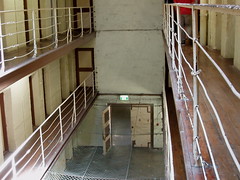 It is often supposed that the threat of trial in an adult court will reduce crime. As with most fear based strategies it is far from the mark.
It is often supposed that the threat of trial in an adult court will reduce crime. As with most fear based strategies it is far from the mark.
Does treating juveniles as adults help reduce crime? In a word, no.
Frontline answered this one succinctly in their website dedicated to juvenile justice:
To date, only two studies have examined whether stricter transfer laws result in lowered juvenile crime rates. Both found that there was no evidence to support that the laws had the intended effect.
Criminologists Simon Singer and David McDowell evaluated the effects of New York’s Juvenile Offender Law on the rate of serious juvenile crime. This landmark piece of legislation was passed in 1978, and lowered the age of criminal court jurisdiction to thirteen for murder, and to fourteen for rape, robbery, assault, and violent categories of burglary. Singer and McDowell analyzed juvenile arrest rates in New York for four years prior to the enactment of the law, and six years after. These rates were compared with those for control groups of thirteen and fourteen year olds in Philadelphia, and with slightly older offenders in New York. The researchers found that the threat of adult criminal sanctions had no effect on the levels of serious juvenile crime.
A later study by social scientists Eric Jensen and Linda Metsger reached a similar conclusion. They sought to evaluate the deterrent effect of the transfer statute passed in Idaho in 1981, which required that juveniles charged with certain serious crimes (murder, attempted murder, robbery, forcible rape, and mayhem) be tried as adults. They examined arrest rates for five years before and five years after the passage of the law, and found no evidence that it had any deterrent effect on the level of juvenile crime in Idaho. The researchers also compared the arrest rates for the target offenses with those in neighboring states Montana and Wyoming, which were demographically similar to Idaho, and had in place a discretionary waiver system similar to the system Idaho had before the new legislation. They found that juvenile arrests for the offenses targeted by the legislation actually increased in Idaho, while decreasing in the other two states.
Yet despite this we still have laws on the books all over the country that encourage sending underage offenders to adult courts. An unfortunate situation that disproportionately affects youth of color.
The study From Time-Out to Hard Time: Young Children in the Adult Criminal Justice System made several recommendations to national and state policymakers back in 2009.
- Children should be kept in the juvenile justice system and mandatory sentencing for young children in adult criminal court should be disallowed.
- Judges should have the discretion to take into account a youth offender’s attitudes toward rehabilitation.
- Regardless of sentence length, youth offenders should always be provided parole opportunities and should never be housed with the adult criminal population.
This is an approach to juvenile enforcement that is not only inhumane but also very costly to taxpayers. The time has come to change that.
Lets close with a slideshow of art created by incarcerated juveniles that was created as a companion to our upcoming book- Born, Not Raised. It should give you glimpse into the disturbing and hopeless world experienced by incarcerated juveniles. Imagine how much worse for those tried as adults and remanded to adult facilities.









